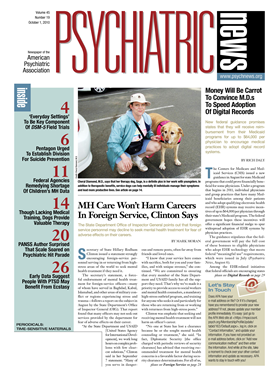One of APA's most important activities is our work on practice guidelines. This month, the third edition of APA's Practice Guideline for the Treatment of Patients With Major Depressive Disorder is being published, both online on
PsychiatryOnline.com and as a supplement to the
American Journal of Psychiatry.
Development of this guideline has followed a challenging path. The process began in 2005 with the appointment of a work group of APA members that included some of our most experienced researchers in the field of depression treatment. The work group, chaired by Alan Gelenberg, M.D., reviewed more than 10,000 studies published since the 2000 edition of the guideline. In 2008 an initial draft of the guideline was made available for review by stakeholders, including the entire APA membership. More than 1,000 pages of comments were received, and the draft document was substantially revised. In May 2009 the Assembly approved the revised guideline, and approval by APA's Board of Trustees and subsequent publication would have usually followed.
As you know, however, expectations regarding the management of potential conflicts of interest for those involved in medical research, education, and practice-guideline development have changed radically in the past several years. In 2008 the Institute of Medicine issued a report calling for clear boundaries between industry funding and educational activities. In June 2009, just one month after Assembly approval of the draft guideline, the APA Board of Trustees established a new policy that chairs and vice chairs of practice-guideline work groups should not receive more than $10,000 a year from direct services to industry, including speaking and consulting, a threshold already established for experts involved in the development of DSM-5.
Both the Board and the work group realized that previous policies that emphasized disclosure were not as rigorous as the current climate warranted. Many members of the work group, including Dr. Gelenberg, had industry ties going back to 2005, when they were initially appointed. These ties included research grants and work as consultants and speakers for the pharmaceutical industry. Although the work group endorsed the scientific integrity of the guideline, they were aware that their relationships with industry might result in perceptions of bias.
To address this perception risk, then-APA President Alan Schatzberg, M.D., working with the new chair of APA's Steering Committee on Practice Guidelines, Joel Yager, M.D., appointed an independent panel to review the guideline before its approval by the APA Board of Trustees. The panel, chaired by Victor Reus, M.D., consisted of experts in depression treatment without current ties to industry. The panel noted that in accordance with available evidence, no particular antidepressant medication is identified by the guideline as more effective or preferred over other antidepressants. In addition, for the treatment of mild and moderate major depressive disorder, the guideline recommends psychotherapy and pharmacotherapy equally. Furthermore, for treatment-resistant depression, newer patented techniques such as transcranial magnetic stimulation and novel pharmacotherapies, including adjunctive second-generation antipsychotics, are described as options supported by accruing evidence. As a result of these observations, the independent panel concluded that the guideline was free of bias, and in March, the Board approved the guideline for publication.
APA policies for managing potential conflicts will continue to evolve. Early this year, the Council of Medical Specialty Societies (CMSS) issued principles for preventing undue influence of industry in the activities of its member societies. One of the principles states that chairs of work groups and the majority of work group members that develop practice guidelines should have no conflicts of interest. How “conflict of interest” is defined and monitored remains an issue in all of medicine. The Board of Trustees and the APA Assembly are reviewing these CMSS principles, and APA is likely to adopt congruent policies, including specific rules for the appointment of future guideline work groups.
In addition, Dr. Yager and project staff, including medical editor Laura Fochtmann, M.D., are innovating APA's guideline development process. Key changes include the following: (1) guideline recommendations will be separately rated according to strength of evidence and strength of recommendation, (2) expert opinion will be determined through formal surveys of research and clinical experts who are identified by a blind nomination method, (3) survey data will guide work groups in determining ratings of strength of recommendation, and (4) work group consensus will be established by Delphi method (a formal method for group decision making using iterative voting, which has been shown to minimize group-process biases).
It will take time to implement these innovations, but we anticipate that our practice guidelines will continue to be of the highest integrity and offer the best evidence-based recommendations both for the profession and for our patients.


